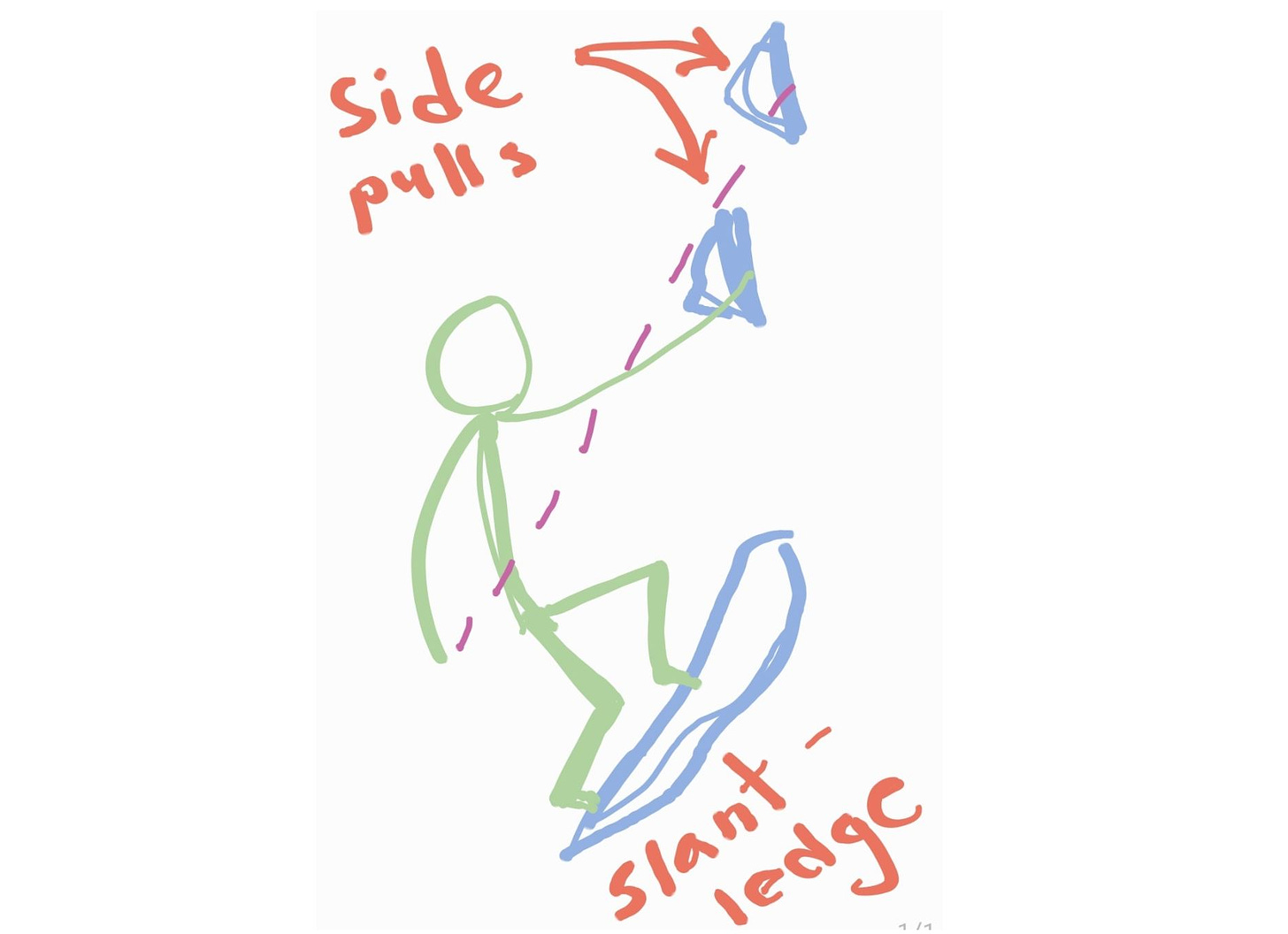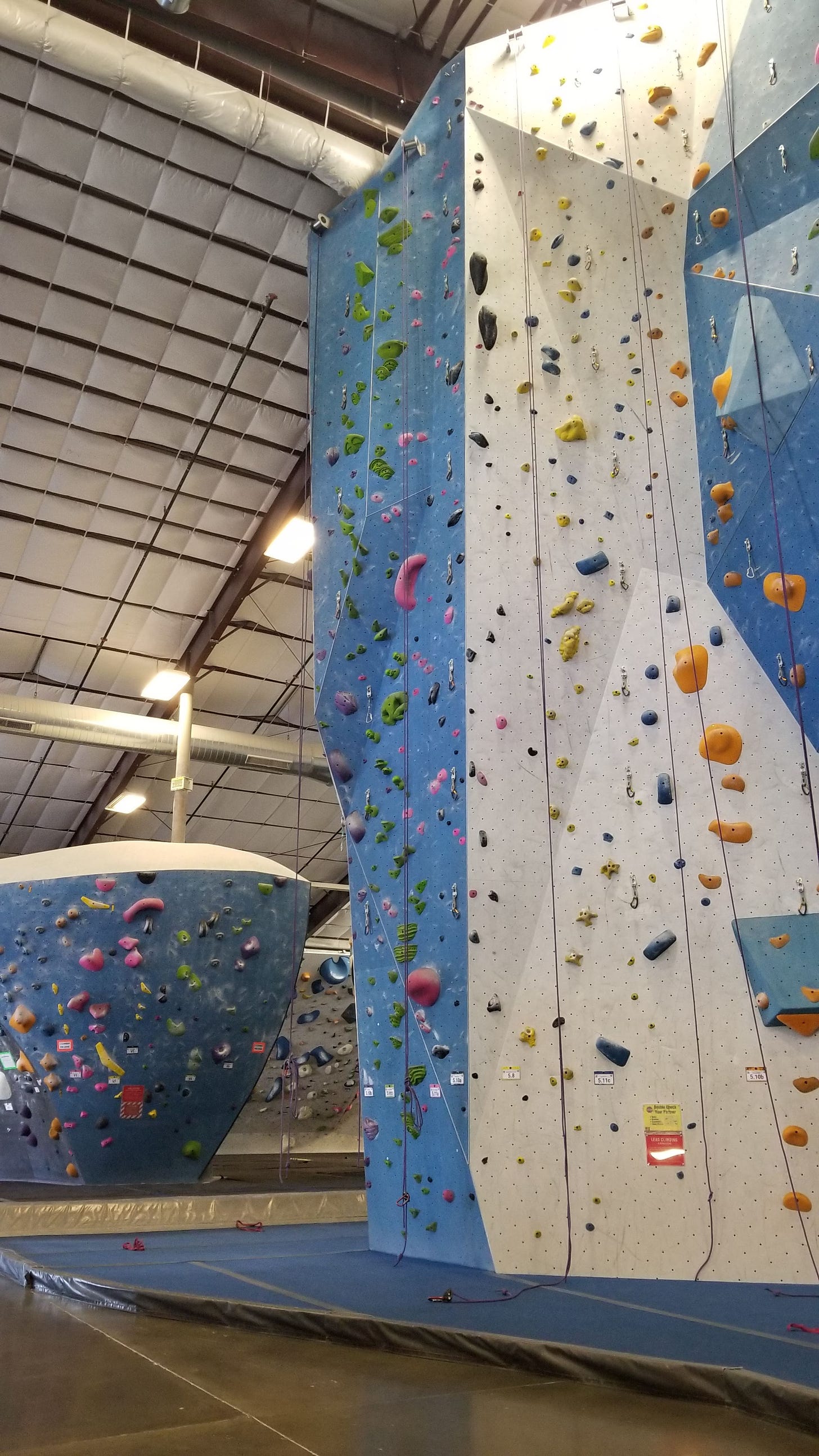How to Fall Without Screaming
The feeling of being "in control" is a largely unhelpful illusion. Here's how to let go of it:
I’m just dropping in a quick preface, since it looks like I have quite a few new subscribers this week. Welcome to Cole’s Climb! This newsletter will appear in your inbox every Thursday morning, promptly at 9 a.m., MST. Trail Talk episodes and guest posts come Sundays.
If you use Gmail, please double check your promotions folder. You can ensure you don’t miss future editions by right clicking this message, and selecting “move to tab,” then “primary.”
You can also follow Cole’s Climb on Facebook, Twitter, or Instagram to have these posts appear in your feed!
I press my toes against the narrow ledge, hard. The foothold is on a steep slope; if I don’t apply constant pressure, my feet are liable to slip right off.
The handhold I’m gripping is a similarly shaped side-pull1, slick with grime from the mixture of sweat, chalk, and spent rubber from the toes of climbing shoes.
Despite all this, I feel relatively comfortable. My body weight hanging back behind my heels is more than enough to keep me on the wall. I reach upward with my left hand toward the next hold, already feeling my center of gravity shift. Halfway through the motion, I stop myself and settle back into the rest position.
High commitment move, I tell myself. Better chalk up for this one.
I reach my hand behind my back and dip my fingers into my chalk bag for a hit of the good stuff. I withdraw my hand and rub my thumb across my fingertips. Much better.
Yet I’m still not satisfied. The skin between my fingers feels sweaty too, sure to be a slimy nuisance when trying to get a good grip on any slopers2 I may encounter. Annoyed, I start reaching for the chalk bag again.
Both feet slip straight off the ledge.
My fingertips glide impotently across their hold.
My stomach drops.
I’m in free-fall.
I yell out in terror.
The lead rope catches me, and my belay partner brings me to a gentle stop.
“Phew,” I say.
A small voice asks: “Daddy, why did he scream?”
I look down to the gym floor, now only ten or so feet below me. A toddler with his own climbing harness and chalk bag is pointing up at me with one hand, and has the other wrapped around the finger of a friendly-looking forty-something man.
This child raised an excellent point. Why did I scream?”
The man, presumably the kid’s father, replies politely: “I think he just got surprised.”
When I finished the problem and returned to the ground, I took inventory of the climb, trying to measure how far I’d fallen.
My best guess put the distance at about eight feet — a pittance in the world of lead climbing falls.
“That’s it? That was my fall?” I asked, incredulous.
“I'd hardly even call that a fall,” my climbing partner admitted.
All According to Plan
Later that night, I took a much bigger fall.
My partner and I were projecting a route that went up the underside of an arch. It involved lots of big moves and of course: hanging upside down for long periods of time.
“I’m going to take this one draw-by-draw3, nice and easy,” I informed her before starting up the series of plastic rocks.
Despite my declaration, I was feeling strong as I swung from one artificial boulder to the next. But near the apex of the arch, my strength started to leave me. My arms buzzed with encroaching weakness as lactic acid built up in my muscles.
My grip faltered.
I knew I was a half-second away from a fall. I chose to let go, accepting my fate in stoic silence. I actually enjoyed the plummet — easily 15 feet by my guess — before the lead rope caught me.
The only difference between these two cases was the conscious decision to let go and accept the drop; I’m certain I would’ve fallen anyway had I tried to hold on.
The Difference a Half-Second Makes
It seems the stranger was spot on. The thing that scares me most is losing the feeling of control — even if it really is only that: a feeling.
My split-second decision to drop on my own terms had absolutely no bearing on the outcome. But it certainly made me feel better about it.
Control works in much the same way. Its effects play out entirely in your head, ultimately serving as nothing more than a reassurance we’re the masters of our own destiny.
But we’re not. And that’s okay.
A hold in which you grab the side that faces away from the pull of gravity. Usually requires you to lean in one direction
A hold one grips with their open palm. Force of friction is the main factor keeping you on the wall
Planning to rest after reaching each piece of protection in the series.






We were talking about this recently in a thread over on E Jean Carroll's newsletter. When I have really been in crisis in my life, submitting to the feeling of falling (apart) rather than putting on a "brave face" and trying to pretend it wasn't happening was always the best thing to do. It didn't make the crisis smaller but I do think it made the recovery shorter.
One cannot rise without falling.